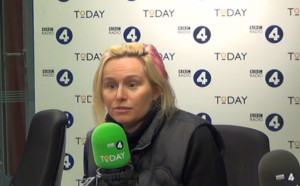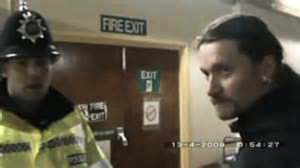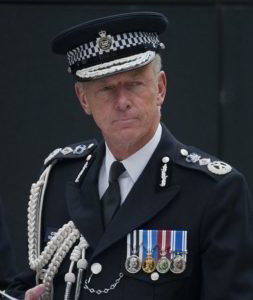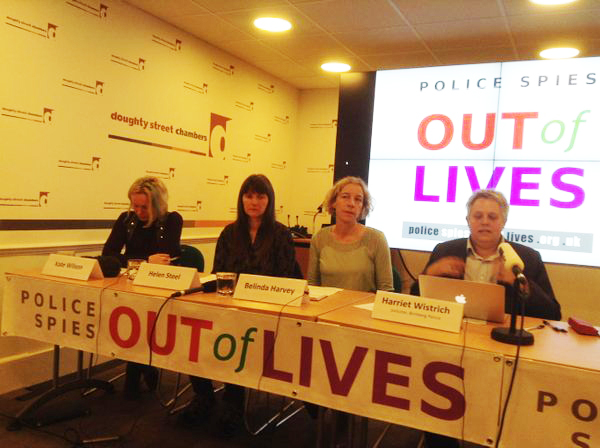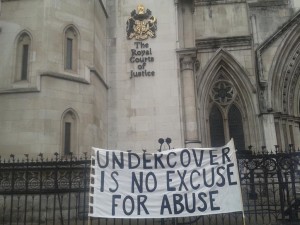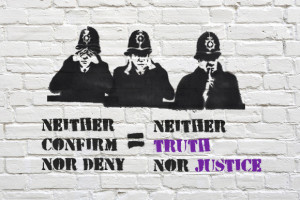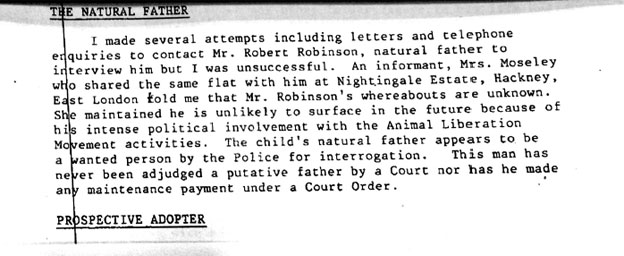Police Demand Money From Compensated Spycops Victim
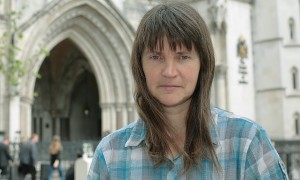
Helen Steel at the Royal Courts of Justice
The Metropolitan Police are demanding £7,000 from a woman they paid damages to after she discovered that her long-term partner was a police spy. The claim is part of their ongoing campaign for secrecy around political undercover police units who have committed human rights abuses.
Helen Steel has been a lifelong social justice campaigner. In the 1990s she was one of the defendants in the McLibel trial, which arose after McDonald’s sued campaigners for libel over a leaflet produced by London Greenpeace. McDonald’s spent millions on the case, but a public support campaign meant the trial was dubbed ‘the greatest corporate PR disaster in history’.
POLICE SPIES AND CORPORATE SPIES
At the trial it was revealed that London Greenpeace had been infiltrated by several corporate spies hired by McDonald’s. But it was only years later that it emerged the group was also infiltrated by undercover police officers from the now-disgraced Special Demonstration Squad. One of them, Bob Lambert, co-wrote the What’s Wrong With McDonald’s leaflet that caused the trial, though this fact was kept from the court. Another officer in the group, John Dines, deceived Steel into a two-year relationship. They lived together, discussed starting a family and planned to spend the rest of their lives with one another. Then Dines feigned a breakdown and disappeared from Steel’s life back into his police career.
In 2011, Steel was one of a group of eight similarly deceived women who brought a legal case against the Metropolitan Police for abuse by five undercover officers. The Met spent many years and huge sums of public money obstructing the case.
NEITHER CONFIRM NOR DENY
After almost three years of the Met claiming they could ‘neither confirm nor deny’ (NCND) that anyone was an undercover officer – a tactic Steel forensically dismantled at a later public inquiry hearing – in 2014 the courts forced their hand.
The women challenged the police use of NCND. In July 2014 they won an important victory when the High Court ruled that there was no legitimate public interest in the Met Police asserting NCND in respect of the allegations that officers had engaged in long term intimate sexual relationships while undercover.
The Court also ruled that as Bob Lambert and Jim Boyling had already been publicly confirmed as undercover officers, the police could no longer maintain NCND in respect of their identities.
MET POLICE CONTINUE TO HIDE THE TRUTH
However, regarding Mark Jenner and John Dines, the Judge said that although the evidence amassed by the women was overwhelming, and it was surely only a matter of time until they were confirmed, he could not force the naming of people who hadn’t outed themselves.
As Steel said at the time
‘It is very disappointing that despite the overwhelming evidence our former partners John Dines and Mark Jenner were also undercover SDS officers, the Judge has allowed the Met to continue to hide the truth about them.’
Steel put in an appeal against this decision. These men were not private individuals, they had been acting as public servants, so the public had a right to know.
A few months after this appeal was lodged the Met held talks with the women to seek a settlement for their civil claims. Just before Christmas 2014 the Met agreed to apologise to the women, though it wasn’t finalised and published for another 11 months.
On 31st December 2014, the Appeal Court agreed that NCND was an important issue and Steel’s argument was well-grounded. They granted her leave to appeal.
COURT GRANTS APPEAL, MET CLAIMS DECEPTION
The Met, with their tactic of trying anything to undermine those they have victimised, attempted to get the appeal struck out. They claimed Steel had misled the appeal court by not informing them that a settlement had been agreed. This was an underhanded trick, given that the settlement hadn’t been finalised, she was unrepresented for the appeal, and the events happened over the Christmas period when people are generally not focussed on legal proceedings.
Steel argued that it was in the public interest to name those responsible for the abuses. A hearing for the Met’s strike-out application took place in July 2015. Steel was unrepresented, and mentally exhausted from the long battle for the truth. She reluctantly acceded to the court’s twofold advice.
Firstly, if she lost the appeal she would be liable to pay the Met’s legal costs, which could wipe out her entire damages in the main claim. Secondly, the forthcoming public inquiry would provide a safer route to argue about the use of NCND and the release of spycops’ names as there were no costs risks.
STEEL DROPS APPEAL, MET CLAIMS £10,000 COSTS
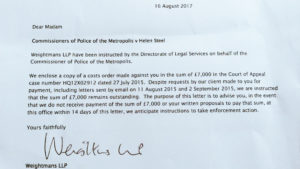 Despite the hearing lasting only about an hour, the police then claimed over £10,000 costs. Although later reduced to £7,000, the ludicrous amounts charged act as a deterrent, intimidating members of the public seeking accountability for wrongdoing committed by police officers. The threat of such an award can be used by the police as a means to intimidate people out of seeking redress.
Despite the hearing lasting only about an hour, the police then claimed over £10,000 costs. Although later reduced to £7,000, the ludicrous amounts charged act as a deterrent, intimidating members of the public seeking accountability for wrongdoing committed by police officers. The threat of such an award can be used by the police as a means to intimidate people out of seeking redress.
The police’s whole argument – that a settlement was agreed – rested on them issuing an apology admitting these men were Met officers who inexcusably abused women. The Met concede they were wrong, and that the women who were deceived into relationships were blameless. Why should officers who have abused members of the public be allowed to hide behind a wall of secrecy?
The apology came with damages for the harm caused by the extreme deception. The Met are now trying to claw money back from a woman they victimised because she tried to get them to do something that they should have done anyway.
PARTIAL CONFIRMATION, MORE DENIAL
The Undercover Policing Inquiry eventually confirmed that Dines was a police officer in December 2016 – a grudging and minimal admission that Steel excoriated. To this day, the police won’t admit Mark Jenner was the undercover officer Mark Cassidy, even though he’s been publicly identified since January 2011.
Women deceived into intimate relationships by undercover police officers want to ensure that these human rights abuses never happen to anyone else. This requires the Met to stop protecting the identities of the abusers. It also requires a legal system that allows funding to enable those who have been abused to challenge their abusers without the risk of becoming bankrupt or losing their homes.
For the Met to have abused these women is horrific enough. For them to inflict the second injustice of legal tricks and obstructions compounds their cruelty. To then to go after Helen Steel for money is an utterly outrageous further leap into the shameless bullying and corruption that has driven their response to the spycops scandal from the start.

